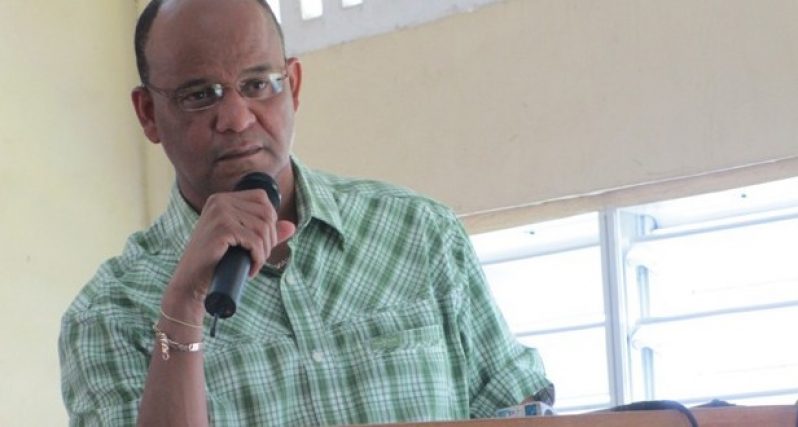GUYANA is a sovereign nation with a strong democracy that has brought the country a long way and with concerns over the November 10 prorogation of Parliament being bandied about, General Secretary of the ruling party, Mr. Clement Rohee, has declared that the impending General Elections will bring an end to the prorogation period.
The announcement of a date for early elections is expected to be made by the Head of State, President Donald Ramotar, soon, according to the People’s Progressive Party (PPP) General Secretary.
Rohee’s comments, made during the PPP’s weekly press conference, held at Freedom House, followed statements made by the British High Commissioner, Mr. Andrew Ayre, at an earlier news conference yesterday, where he addressed Guyana’s political status quo.
The PPP General Secretary declared that Guyana was removed from under the control of British colonial rule since 1966, and as such a determination of the country’s course is a decision for its people.
Ayre’s comments were largely premised on the November 10 prorogation of Parliament and the fact that it has continued to date. This development has forced Guyana’s Head of State President Donald Ramotar to signal his intention to soon call General and Regional Elections.
Ambassador Ayre is of the opinion that Guyana is in “clear breach” of the Commonwealth Charter and Guyana’s Constitution.
Rohee nonetheless countered saying, “Prorogation was not a decision that was made lightly; there were concerns on all sides,” he said, also making clear that the reasons for the decision were explicit.
ELECTIONS END PROROGATION
The move to impending general and regional elections, the PPP General Secretary reiterated, will end prorogation. “Elections are on the horizon,” he declared.
A move by the President to set a date will have a bearing on several processes. Once a date is set, it will translate to the dissolution of Parliament, which currently stands prorogued for up to a constitutional maximum time of six months.
He stated too that the British High Commissioner, in so much as he claimed “a clear breach” of Guyana’s Constitution, has ignored that the country’s Constitution provides for prorogation.
Article 70 (1) of the Constitution states that: “The President may at any time by proclamation prorogue Parliament.”
BEYOND DIPLOMATIC PROTOCOLS
Rohee expressed concern that Ayre’s comments have gone beyond diplomatic protocols.
“It (statements on the local political state of affairs) might be going a little bit beyond the pale in so far as diplomatic practice is concerned,” Rohee said.
He acknowledged that, as a local investor and donor, concerns, particularly in the lead up to impending general and regional elections, are expected.
However, the former Foreign Affairs Minister restated that, “There’s a limit to which we should go when dealing with these matters. I see that as a normal course of their duties…. in so far as the PPP is concerned, it might be going a little bit beyond the pale in so far as diplomatic practice is concerned.”
Rohee added, “This is an independent country. The British have their own arrangements there too, so you know, take it or leave it, twist it or turn it; however you will want to put it, the fact of the matter is that Guyana is an independent country; we have our own Constitution.”
DIALOGUE
President Ramotar has always maintained that the need for dialogue was uppermost in his mind when he made his decision to Prorogue Parliament on November 10.
Paving the way for greater dialogue among political parties, he contends, would have kept the 10th Parliament alive to address critically important issues currently before the House.
The effect of ending the first session of the 10th Parliament by way of prorogation is the suspension of the business of the National Assembly.
As a result, the Alliance For Change (AFC) sponsored ‘No-Confidence’ motion was not considered. A Partnership for National Unity (APNU) had, prior to November 10, signalled its intent to support the motion.
Had it not been for the proclamation to prorogue Parliament and the no-confidence motion approved by the political Opposition, Guyana would have been headed to early general elections within three months.
However, President Ramotar has made it clear that if these efforts prove futile, there will be a move to early general elections.
Since the prorogation, APNU and the AFC have made it clear that they will not engage the President in talks unless the prorogation is lifted and Parliamentary work resumes. The rejection of talks was also formally communicated by APNU Leader, Brigadier (rtd) David Granger in a December 2 letter responding to the President’s November 18 invitation for talks.
The most recent contention of the current Administration, following these positions, is that the prorogation objectives have been lost.
President Ramotar has since indicated that Guyana will head to early general and regional elections, just over three years since the November 2011 polls.
BRITS GAVE US PROROGATION
Additionally, in a prior comment, Attorney General (AG) and Minister of Legal Affairs, Anil Nandlall, traced the use of prorogation powers in other Commonwealth nations.
He said, “It (prorogation) was bequeathed to every country in the British Commonwealth upon their attainment of Independence.
“It has been widely used over the years without the big hue and cry, which it has generated in Guyana.
“In Canada, for example, it has been used twice over the last seven years. Only recently (2013) it was used in Australia. I do not recall those who are critical of its use in Guyana, being similarly critical when it was employed in these countries.”
To this end, Nandlall made it clear that there can be nothing “unlawful or undemocratic” in utilising the tool that is prorogation. “I reject the notion that there is anything unlawful or undemocratic about prorogation,” he said.
Noteworthy also is the fact that prorogation has been a concept enshrined in the British Constitutional system for nearly 1,000 years.
(By Vanessa Narine)





.jpg)








